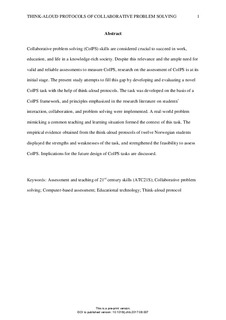Revealing the processes of students' interaction with a novel collaborative problem solving task: An in-depth analysis of think-aloud protocols
Journal article, Peer reviewed
Submitted version

View/
Date
2017-08-04Metadata
Show full item recordCollections
Original version
Siddiq, F. & Scherer, R. (2017). Revealing the processes of students' interaction with a novel collaborative problem solving task: An in-depth analysis of think-aloud protocols. Computers in Human Behavior, 76, 509-525. 10.1016/j.chb.2017.08.007Abstract
Collaborative problem solving (ColPS) skills are considered crucial to succeed in work, education, and life in a knowledge-rich society. Nevertheless, research on the assessment of ColPS is at its initial stage; specifically, assessments of synchronous student-student ColPS in digital environments have been scarcely investigated, and there is an ample need for valid and reliable assessments to measure ColPS. The present study attempts to fill this gap by proposing a novel ColPS task and investigating students' ColPS skills with the help of think-aloud protocols while they were taking an online performance-based test. The task was developed on the basis of a ColPS framework, and principles emphasized in the research literature on students’ interaction, collaboration, and problem solving were implemented. A real-world problem mimicking a common teaching and learning situation formed the context of this task. The empirical evidence obtained from the think-aloud protocols of eleven Norwegian students displayed the strengths and weaknesses of the task, and strengthened the feasibility to assess ColPS. Implications for the future design of ColPS tasks are discussed.